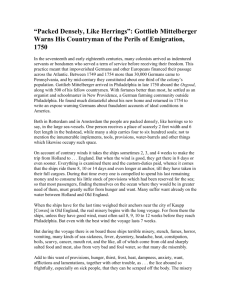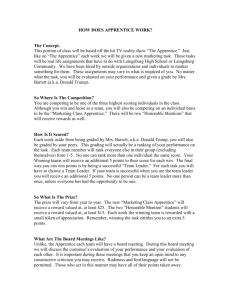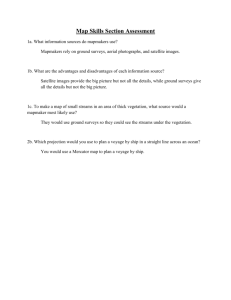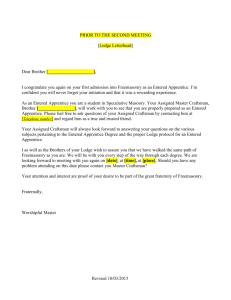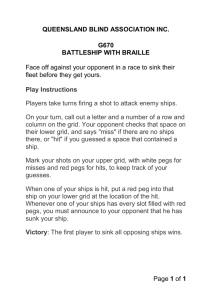Commoners
advertisement
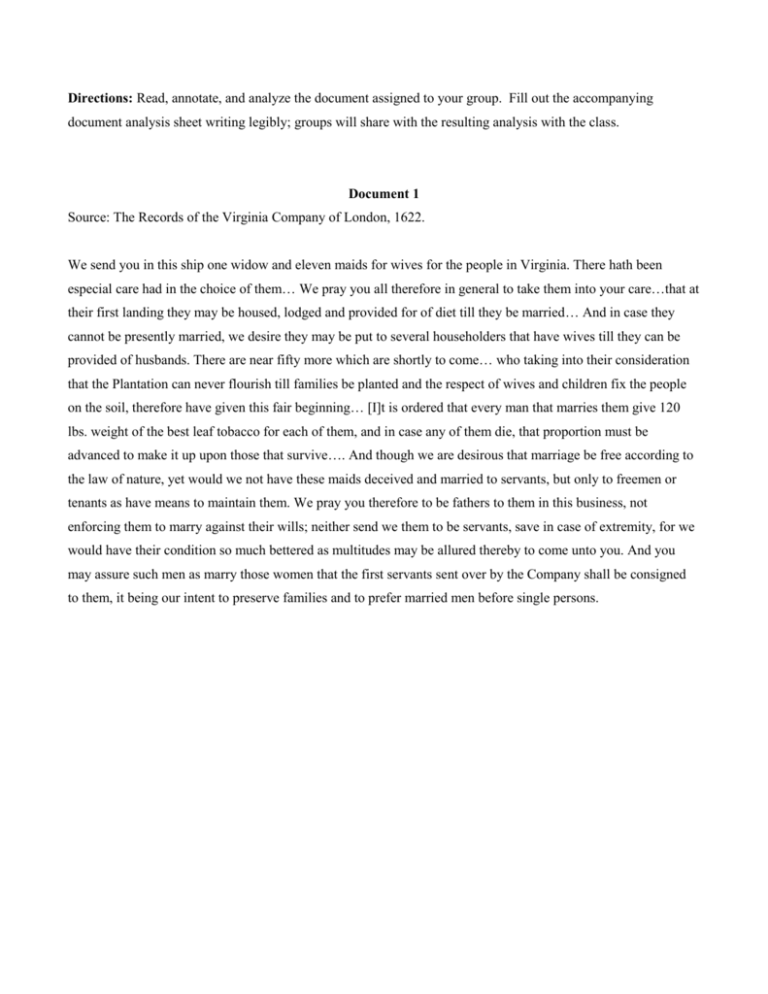
Directions: Read, annotate, and analyze the document assigned to your group. Fill out the accompanying document analysis sheet writing legibly; groups will share with the resulting analysis with the class. Document 1 Source: The Records of the Virginia Company of London, 1622. We send you in this ship one widow and eleven maids for wives for the people in Virginia. There hath been especial care had in the choice of them… We pray you all therefore in general to take them into your care…that at their first landing they may be housed, lodged and provided for of diet till they be married… And in case they cannot be presently married, we desire they may be put to several householders that have wives till they can be provided of husbands. There are near fifty more which are shortly to come… who taking into their consideration that the Plantation can never flourish till families be planted and the respect of wives and children fix the people on the soil, therefore have given this fair beginning… [I]t is ordered that every man that marries them give 120 lbs. weight of the best leaf tobacco for each of them, and in case any of them die, that proportion must be advanced to make it up upon those that survive…. And though we are desirous that marriage be free according to the law of nature, yet would we not have these maids deceived and married to servants, but only to freemen or tenants as have means to maintain them. We pray you therefore to be fathers to them in this business, not enforcing them to marry against their wills; neither send we them to be servants, save in case of extremity, for we would have their condition so much bettered as multitudes may be allured thereby to come unto you. And you may assure such men as marry those women that the first servants sent over by the Company shall be consigned to them, it being our intent to preserve families and to prefer married men before single persons. Document 2 Source: Richard Frethorne, Indentured Servant in Virginia, Letter Home, 1623. Loving and kind father and mother: My most humble duty remembered to you, hoping in God of your good health…This is to let you understand that I your child am in a most heavy case by reason of the nature of the country, [which] is such that it causeth much sickness, [such] as the scurvy and the bloody flux and diverse other diseases, which maketh the body very poor and weak. And when we are sick there is nothing to comfort for us; for since I came out of the ship I never ate anything but peas, and loblollie (that is, water gruel). As for deer or venison I never saw any since I came into this land. There is indeed some fowl, but we are not allowed to go and get it, but must work hard both early and late for a mess of water gruel and a mouthful of bread and beef. A mouthful of bread for a penny loaf must serve for four men which is most pitiful. [You would be grieved] if you did know as much as [I do], when people cry out day and night – Oh! that they were in England without their limbs – and would not care to lose any limb to be in England again, yea, though they beg from door to door. For we live in fear of the enemy [Powhatan Indians] every hour, yet we have had a combat with them on the Sunday before Shrovetide [Monday before Ash Wednesday], and we took two alive and made slaves of them. But it was by policy, for we are in great danger; for our plantation is very weak by reason of the death and sickness of our company… [W]e are but 32 to fight against 3000 if they should come. And the nighest help that we have is ten miles of us, and when the rogues overcame this place [the] last [time] they slew 80 persons…. And I have nothing to comfort me, nor there is nothing to be gotten here but sickness and death, except [in the event] that one had money to layout in some things for profit. But I have nothing at all… So that I have not a penny, nor a penny worth, to help me to either spice or sugar or strong waters, without the which one cannot live here… But I am not half a quarter so strong as I was in England, and all is for want of victuals; for I do protest unto you that I have eaten more in [one] day at home than I have allowed me here for a week…. But for God's sake send beef and cheese and butter… But if you send cheese, it must be very old cheese; and…you must have a care how you pack it in barrels; and you must put cooper's chips between every cheese, or else the heat of the hold will rot them. And look whatsoever you send me… what[ever] I make of it, I will deal truly with you… Good father, do not forget me, but have mercy and pity…. I pray you to remember my love to all my friends and kindred. I hope all my brothers and sisters are in good health, and as for my part I have set down my resolution that certainly will be; that is, that the answer of this letter will be life or death to me. Therefore, good father, send as soon as you can…. Document 3 Source: John Lawson, English naturalist and traveler, A New Voyage to Carolina, 1709. The women are the most industrious sex in that place, and, by their good houswifery, make a great deal of cloth of their own cotton, wool and flax; some of them keeping their families (though large) very decently appareled, both with linens and woolens, so that they have no occasion to run into the merchant's debt, or lay their money out on stores for clothing…. They marry very young; some at thirteen or fourteen; and she that stays till twenty, is reckoned a stale maid… The women are very fruitful; most houses being full of little ones… They have very easy travail in their childbearing, in which they are so happy, as seldom to miscarry…. Many of the women are very handy in canoes, and will manage them with great dexterity and skill, which they become accustomed to in this watery country. They are ready to help their husbands in any servile work, as planting, when the season of the weather requires expedition; pride seldom banishing good houswifery. The girls are not bred up to the [spinning] wheel and sewing only; but the dairy and affairs of the house they are very well acquainted withal; so that you shall see them, whilst very young, manage their business with a great deal of conduct and alacrity. Document 4 Source: A New York indenture contract for a cordwainer, 1718. THIS INDENTURE WITNESSES that I, William Mathews, son of Marrat of the city of New York, a widow…does voluntarily and of his own free will and accord and by the consent of his said mother put himself as an apprentice cordwainer [maker of fine leather products] to Thomas Windover of the city aforesaid. He will live and (after the manner of an apprentice) serve from August 15, I7I8, until the full term of seven years be completed and ended. During all of this term, the said apprentice shall faithfully serve his said master, shall faithfully keep his secrets, and gladly obey his lawful commands everywhere. He shall do no damage to his said master, nor see any done by others without giving notice to his said master. He shall not waste his said master's goods nor lend them unlawfully to any. He shall not commit fornication nor contract matrimony within the said term. At cards, dice, or any other unlawful game, he shall not play (whereby his said master may have damage) with his own goods or the goods of others. Without a license from his master he shall neither buy nor sell during the said term. He shall not absent himself day or night from his master's service without his leave, nor haunt alehouses, but in all things he shall behave himself as a faithful apprentice toward his master all during his said term. The said master, during the said term, shall, by the best means or methods, teach or cause the said apprentice to be taught the art or mystery of a cordwainer. He shall find and provide unto the said apprentice sufficient meat, drink, apparel, lodging, and washing fit for an apprentice. During the said term, every night in winter he shall give the apprentice one quarter of schooling. At the expiration of the said term he shall provide him with a sufficient new suit of apparel, four shirts, and two necklets [scarves]. Document 5 Source: Elizabeth Sprigs, indentured servant in Maryland, letter to John Spyer, 1756. Honored Father, My being forever banished from your sight, will I hope pardon the boldness I now take of troubling you with these. My long silence has been purely owing to my undutifulness to you, and well knowing I had offended in the highest degree, put a tie to my tongue and pen, for fear I should be extinct from your good graces and add a further trouble to you. But too well knowing your care and tenderness for me so long as I retained my duty to you, induced me once again to endeavor, if possible, to kindle up that flame again. O Dear father, believe what I am going to relate the words of truth and sincerity, and balance my former bad conduct [to] my sufferings here, and then I am sure you'll pity your distressed daughter. What we unfortunate English people suffer here is beyond the probability of you in England to conceive. Let it suffice that I am one of the unhappy number, am toiling almost day and night, and very often in the horse's drudgery…and then tied up and whipped to that degree that you now serve an animal. Scarce anything but Indian corn and salt to eat and that even begrudged nay many Negroes are better used, almost naked no shoes nor stockings to wear, and the comfort after slaving during master's pleasure, what rest we can get is to wrap ourselves up in a blanket and lie upon the ground. This is the deplorable condition your poor Betty endures, and now I beg if you have any bowels of compassion left show it by sending me some relief. Clothing is the principal thing wanting, which if you should condescend to, may easily send them to me by any of the ships bound to Baltimore town. Patapsco River. Maryland. And give me leave to conclude in duty to you and uncles and aunts, and respect to all friends. Honored Father Your undutiful and disobedient child Elizabeth Sprigs Document 6 Source: Gottlieb Mittelberger, German schoolmaster and sojourner, Journey to Pennsylvania, 1756. The most important occasion for publishing this little book was the wretched and grievous condition of those who travel from Germany to this new land, and the outrageous and merciless proceeding of the Dutch man- dealers and their man- stealing emissaries; I mean the so- called newlanders, for they steal, as it were, German people under all manner of false pretenses, and deliver them into the hands of the great Dutch traffickers in human souls… [W]hen it became known that I was about to return to Württemberg, many…implored me with tears and uplifted hands, and even in the name of God, to make this misery and sorrow known in Germany, so that not only the common people, but even princes and lords, might learn how they had fared, to prevent other innocent souls from leaving their fatherland, persuaded thereto by the newlanders, and from being sold into a like slavery… On account of contrary winds it takes the ships sometimes 2, 3 and 4 weeks to make the trip from Holland…to England. But when the wind is good, they get there in 8 days or even sooner. Everything is examined there and the custom- duties paid, whence it comes that the ships ride there 8, 10 to 14 days and even longer at anchor, till they have taken in their full cargoes… When the ships have for the last time weighed their anchors…in Old England, the real misery begins with the long voyage. For from there the ships, unless they have good wind, must often sail 8, 9, 10 to 12 weeks before they reach Philadelphia. But even with the best wind the voyage lasts 7 weeks. But during the voyage there is on board these ships terrible misery, stench, fumes, horror, vomiting, many kinds of sea- sickness, fever, dysentery, headache, heat, constipation, boils, scurvy, cancer, mouth- rot, and the like, all of which come from old and sharply salted food and meat, also from very bad and foul water, so that many die miserably. Add to this want of provisions, hunger, thirst, frost, heat, dampness, anxiety, want, afflictions and lamentations, together with other trouble, the lice abound so frightfully, especially on sick people, that they can be scraped off the body. The misery reaches the climax when a gale rages for 2 or 3 nights and days, so that everyone believes that the ship will go to the bottom with all human beings on board. In such a visitation the people cry and pray most piteously…. Children from 1 to 7 years rarely survive the voyage; and many a time parents are compelled to see their children miserably suffer and die from hunger, thirst and sickness, and then to see them cast into the water. I witnessed such misery in no less than 32 children in our ship, all of whom were thrown into the sea. The parents grieve all the more since their children find no resting- place in the earth, but are devoured by the monsters of the sea. It is a notable fact that children, who have not yet had the measles or small- pocks, generally get them on board the ship, and mostly die of them. The sale of human beings in the market on board the ship is carried on thus: Every day Englishmen, Dutchmen and High-German people come from the city of Philadelphia and other places… and go on board…and select among the healthy persons such as they deem suitable for their business, and bargain with them how long they will serve for their passage money… [A]dult persons bind themselves in writing to serve 3, 4, 5 or 6 years for the amount due by them, according to their age and strength. But very young people, from 10 to 15 years, must serve till they are 21 years old. Many parents must sell and trade away their children like so many head of cattle; for if their children take the debt upon themselves, the parents can leave the ship free and unrestrained; but as the parents often do not know where and to what people their children are going, it often happens that such parents and children, after leaving the ship, do not see each other again for many years, perhaps no more in all their lives…. Document 7 Source: Johannes, Hänner, an immigrant to Pennsylvania, 1769. Dearest Father, Brother, and Sister and Brother-in-law,… To begin with, we are all, thank God, fresh and healthy as long as the Lord wills, and if at last you are also in good health, this would delight my heart. I have told you quite fully about the trip, and I will tell you what will not surprise you-that we have a free country. Of the sundry craftsmen, one may do whatever one wants. Nor does the land require payment of tithes [taxes requiring payment of a portion of a farmer's produce to a local landlord, typical in Europe]…. By the way, wheat is grown most frequently, rye, oats,…apples are plentiful…. The land is very big from Canada to the east of us to Carolina in the south and to the Spanish border in the west…. I have always enough to do and we have no shortage of food. Bread is plentiful. If I work for two days I earn more bread than in eight days [at home]…. Also I can buy many things so reasonably [for example] a pair of shoes for [roughly] seven Pennsylvania shillings…. I think that with God's help I will obtain land. I am not pushing for it until I am in a better position. I would like for my brother to come…and it will then be even nicer in the country…. I assume that the land has been described to you sufficiently by various people and it is not surprising that the immigrant agents [demand payment]. For the journey is long and it costs much to stay away for one year…. And at this point I finally greet you all with all good friends and acquaintances very cordially, and I command all of you to the care of the Lord so that you may be well in soul and body. What does document ____ reveal about life for people in the ______________________ colony? Cite and explain specific evidence from the passage. Write an ‘Extended Document Analysis’ that would earn a point on the DBQ rubric.
